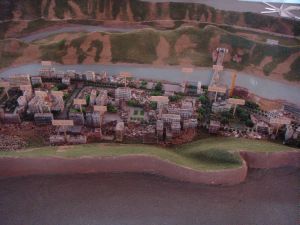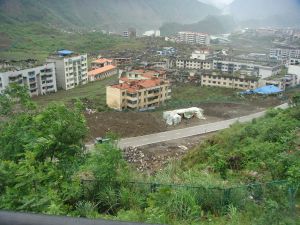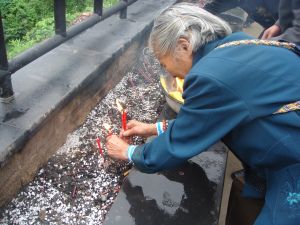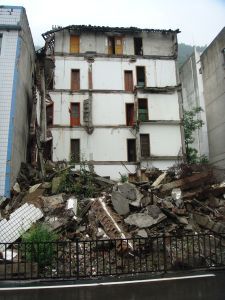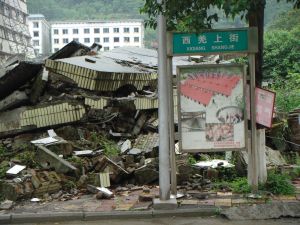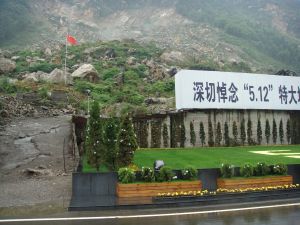[BACK] [NEXT]
Letter 50
Monday 31.05.10
A quiet night. Hereís not even a paper bin. But the landlord is a small,
friendly, smiling man. Iím ready to leave at 8. Thereís a light rain. He sees me
to the bus. And explain the nescessary to the driver.
Shortly after we take off. After the bridge we enter a wide triangle valley. The
first temporary houses and a smaller construction is going on, thatís what
theyíre waiting for probably. There are old people so itís not houses for the
workers.
A wide road with 2 lanes and shoulder in each direction is being constructed.
The valley narrows. There is a qiang village with the characteristic towers to
the left. Did it survive or is it reconstructed?
From time to time you see the brown scars from landslides on the green mountain
sides. Thereís a small partly reconstructed qiang village without towers.
Then I suddenly have to get off. This is the center it seems. From here you are
going by busses the 7 km to the old Beichuan.
They quickly find a young man that speaks english when I appear. Unfortunately
itís raining so no busses are leaving. Itís for security purposes I have to
understand. When it rains the road becomes dangerous. I know.
I face the facts, SO close and yet not.
But here I can get answers to many of my questions. He shows me around the
exhibition and we talk for long. He was sleeping in his dormitory in his college
in Mianyang when it happened. His friends woke him up and they rushed out from
the first floor. The quake wasnít over when they stood outside. Two students
were killed as they jumped out from high up. A tragedy in the tragedy.
Then the rain has eased enough, so we will go, much to my surprise. Itís mainly
elderly local women. The bus is full. Heís coming with us as a guide.
We drive down the almost finished road passing a large area with temporary
houses just before reaching the gate. The area is fenced in like a prison camp.
Barbed wire all around.
We do stop at some viewpoint and I get my photos and the locals burn their paper
money. Right there before my eyes is the disaster.
From a distance itís still a little like a picture, but as we stroll around the
remains in the newer part of town where people still lies burried under the
houses where just the ground floor collapsed, things get really close,
I walk around with my private guide and from time to time I have to stop talking
to get my feelings under control.
You cannot go to the older part of town, it was burried in mud later in
september 2008, when there were heavy rains. Just 3 of 7 floors are still above
the ground.
In the newer part of town you can walk around on a circle road to watch the
demolished houses. Just one house was left unharmed. The two tiles that are
missing were also missing in 2008.
The junior middle school is the most shocking. The mountain came down and itís
totally burried. Around 30 pupils who were having physics near the gate escaped.
The rest of the more than 300 and their teachers are still down there somewhere.
If you wonder how 19.000 people can be missing still, you understand now.
At the senior middle school outside the fenced in area I buy 2
unauthorized DVDís to support the local people. Some of the people here
selling all sorts of souvenirs lost their children in the accident he
tells me.
Back in the center I receive the official DVD as a gift and we exchange
email addreses.
Iím lucky that a bus arrives just the moment I step outside. Iím a bit
stupid as usual. I havenít seen the bus is heading for Mianyang even it
said so on the sign in the window - for those that are able to read!
Itís not until she demanding says "Mianyang" I understand, that she has
to know where Iím going. "Anchang". Itís still just 5 RMB but thatís
even a bit expensive for this short distance.
I asked if there had been any other foreigners? Some canadians and
germans he said. Several.
Itís raining now I have to go on the bike, but I have to, itís now
12.45. And when youíre out there itís not so hard as you imagine.
Itís mostly a light drizzle - from time to time almost nothing. I stop
at a gas station I know from going the other direction to look at the
map and make a decision on which way to go. A young man comes to help me.
Heís one of the few uneducated language skilled people who is able to
communicate. We donít have many mutual words, but we can discuss what we
know about: the road.
He tries to persuade me to take the shortcut to Luojiang, which means I
have to go right in the crossing and later to the left via some town
whoís name Iíve forgotten. To him there would be no doubt, but I have
mine. I prefer going 10-15 km extra to avoid problems. So I decide to go
straight to Mianyang to get to the G108 - my old friend - there.
This turns out to be a good choice. I reach it on the right side of
Mianyang and ask the first person I meet, a woman - I usually donít ask
women sorry to say - if this is 108? Yes. And 200 mís later a sign tells
too.
Then the rain increases and I stop partly sheltered to eat.
I didnít remember the long incline across "the mountain range" that
clear. Two years ago I was coming from the north-east part of Sichuan
with all the unbearable small mountains, up and down and up and down,
and then this was probably nothing. Now this one really makes me work.
But then comes this fantastic downhill, maybe 4 km with 50-60 km/h.
There is a fine tail wind and my legs have begun working like an engine.
Iím really getting somewhere.
I reach Luojiang that was originally my goal for the day, but I feel I
can do more and the longer today the better...
I get afraid I missed Deyang by mistake? But in the end it turns up. I
find some hotels in the center but 2-300 RMB for a night is TOO much
even I could use a comfortable room where everything works. So I use my
"nose" and find a chinese style hotel for 60 RMB. Itís not exactly my
wildest dreams.
Now at 10.30 p.m. the rain has started - again.
